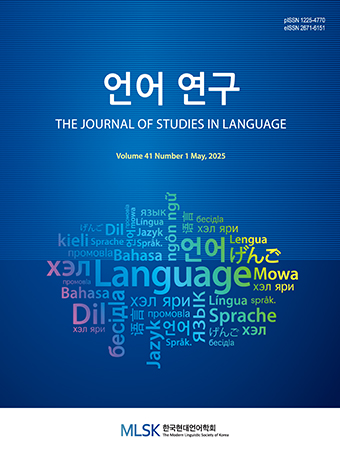Research Article
Abstract
References
Information
This paper examines the lexical meanings of the adjective ‘good’ in advertisement slogans. It shows how listeners can infer the meaning of ‘good’ and finally construct the ad hoc concept. With the relevance-theoretic approach, adjectives in advertisement slogans are generally a significant feature of describing the advertised items. However, the previous studies often focus on the issues related to the statistical frequency of adjective usages. Based on bestslogans.com websites, the slogans with the adjective ‘good’ were extracted and lexical and contextual information was analyzed to see its use and possible interpretation. The findings indicate that adjective ‘good’ shows extraordinary sensitivity to context, and a number of ad hoc concepts are identified. Results also show that inferring the meaning of an adjective needs thorough understanding of contextual information.
- Barsalou, L. 1987. The Instability of Graded Structure in Concepts. In Neisser, U. (ed.), Concepts and Conceptual Development: Encological and Intellectual Factors in Categorization. Cambridge: Cambridge University Press, 101-140.
- Carston, R. 2002a. Metaphor, Ad hoc Concepts and Word Meaning–More Questions than Answers. UCL Working Papers in Linguistics 14, 83-105.
- Carston, R. 2002b. Thoughts and Utterances: the Pragmatics of Explicit Communication. Oxford: Blackwell. 10.1002/9780470754603 11964277
- Carston, R. 2010. Lexical Pragmatics, Ad hoc Concepts and Metaphor: A Relevance Theory Perspective. Italian Journal of Linguistics 22, 157-180.
- Carston, R. 2019. Ad hoc Concepts, Polysemy and the Lexicon. Cambridge: Cambridge University Press. 10.1017/9781108290593.014
- Glucksberg, S. 2001. Understanding Figurative Language: From Metaphors to Idioms. Oxford: Oxford University Press. 10.1093/acprof:oso/9780195111095.001.0001
- Goddard, A. 2002. The Language of Advertising Written Texts. (2nd ed.). London: Routledge.
- Grice, H. P. 1975. Logic and conversation. In P. Cole ans J. Morgan (ed.), Syntax and Semantics Vol. 3: Speech Acts. New York: Academic Press, 41-58. 10.1163/9789004368811_003
- Hakkarainen, M. 2016. They Sell it How? A Study on Adjective Use in English and Finnish Ford Adverts. MA Thesis. University of Eastern Finland.
- Ke, Q. and Wang, W. 2013. The adjective frequency in advertising English slogans. Theory and Practice in Language Studies 3.2, 275-284. 10.4304/tpls.3.2.275-284
- Laserson, P. 1999. Pragmatic halos. Language 75, 522-551. 10.2307/417059
- Leech, G. 1966. English in Advertising. A Linguistic Study of Advertising in Great Britain. London: Longman.
- Myers, G. 1994. Words in Ads. Tonbridge, Kent: Green Gate Publishing.
- Sperber, D. and Wilson, D. 1986. Relevance. Language and Cognition. Oxford: Blackwell.
- Wilson D. and Carston, R. 2007. A Unitary Approach to Lexical Pragmatics: Relevance, Inference and Ad Hoc Concepts. In: N. Burton-Roberts(ed.), Pragmatics. Basingstoke: Palgrave Macmillan, 230-259. 10.1057/978-1-349-73908-0_12
- Wilson, D. and Kolaiti. P. 2017. “Lexical pragmatics and implicit communication” in P. Cap and M. Dynel (eds.), Implicitness. From Lexis to Discourse, 147-175. Amsterdam: John Benjamins. 10.1075/pbns.276.07wil
- Wilson, D. and Sperber, D. 2004. Relevance theory. In Horn, L. and Ward, G. (ed.), Handbook of Pragmatics. Oxford: Blackwell. 607-632.
- Publisher :The Modern Linguistic Society of Korea
- Publisher(Ko) :한국현대언어학회
- Journal Title :The Journal of Studies in Language
- Journal Title(Ko) :언어연구
- Volume : 38
- No :1
- Pages :7-19
- DOI :https://doi.org/10.18627/jslg.38.1.202205.7




 The Journal of Studies in Language
The Journal of Studies in Language






